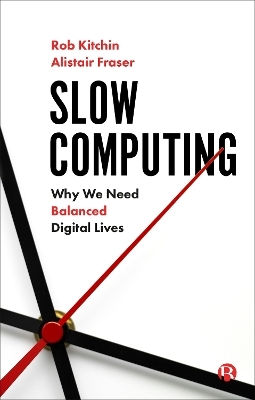
Slow Computing
Why We Need Balanced Digital Lives
Seiten
2020
Bristol University Press (Verlag)
978-1-5292-1126-9 (ISBN)
Bristol University Press (Verlag)
978-1-5292-1126-9 (ISBN)
Is it possible to experience the joy and benefits of computing in a way that asserts individual and collective autonomy?
Drawing on the ideas of the ‘slow movement’, Slow Computing sets out numerous practical and political means to take back control and counter the more pernicious effects of living digital lives.
Digital technologies should be making life easier. And to a large degree they are, transforming everyday tasks of work, consumption, communication, travel and play. But they are also accelerating and fragmenting our lives affecting our well-being and exposing us to extensive data extraction and profiling that helps determine our life chances.
Initially, the COVID-19 pandemic lockdown seemed to create new opportunities for people to practice ‘slow computing’, but it quickly became clear that it was as difficult, if not more so, than during normal times.
Is it then possible to experience the joy and benefits of computing, but to do so in a way that asserts individual and collective autonomy over our time and data?
Drawing on the ideas of the ‘slow movement’, Slow Computing sets out numerous practical and political means to take back control and counter the more pernicious effects of living digital lives.
Drawing on the ideas of the ‘slow movement’, Slow Computing sets out numerous practical and political means to take back control and counter the more pernicious effects of living digital lives.
Digital technologies should be making life easier. And to a large degree they are, transforming everyday tasks of work, consumption, communication, travel and play. But they are also accelerating and fragmenting our lives affecting our well-being and exposing us to extensive data extraction and profiling that helps determine our life chances.
Initially, the COVID-19 pandemic lockdown seemed to create new opportunities for people to practice ‘slow computing’, but it quickly became clear that it was as difficult, if not more so, than during normal times.
Is it then possible to experience the joy and benefits of computing, but to do so in a way that asserts individual and collective autonomy over our time and data?
Drawing on the ideas of the ‘slow movement’, Slow Computing sets out numerous practical and political means to take back control and counter the more pernicious effects of living digital lives.
Rob Kitchin is a Professor in the Maynooth University Social Sciences Institute, Ireland. He is author/editor of a number of books about technology and society, and is a recipient of the Royal Irish Academy’s Gold Medal for the Social Sciences. Alistair Fraser is a Lecturer in Geography in Maynooth University, Ireland. His research engages diverse themes, including rural change, food, music, and digital life.
Living Digital Lives
Accelerating Life
Monitoring Life
Personal Strategies of Slow Computing
Slow Computing Collectively
An Ethics of Digital Care
Towards a More Balanced Digital Society
| Erscheinungsdatum | 25.09.2020 |
|---|---|
| Zusatzinfo | Not illustrated |
| Sprache | englisch |
| Maße | 138 x 216 mm |
| Themenwelt | Mathematik / Informatik ► Informatik |
| Sozialwissenschaften ► Kommunikation / Medien ► Medienwissenschaft | |
| Sozialwissenschaften ► Soziologie | |
| ISBN-10 | 1-5292-1126-3 / 1529211263 |
| ISBN-13 | 978-1-5292-1126-9 / 9781529211269 |
| Zustand | Neuware |
| Haben Sie eine Frage zum Produkt? |
Mehr entdecken
aus dem Bereich
aus dem Bereich
wie KI und virtuelle Welten von uns Besitz ergreifen – und die …
Buch | Hardcover (2023)
Heyne (Verlag)
CHF 29,90
eine jüdische Filmgeschichte der Bundesrepublik
Buch | Hardcover (2023)
Hanser (Verlag)
CHF 39,20


